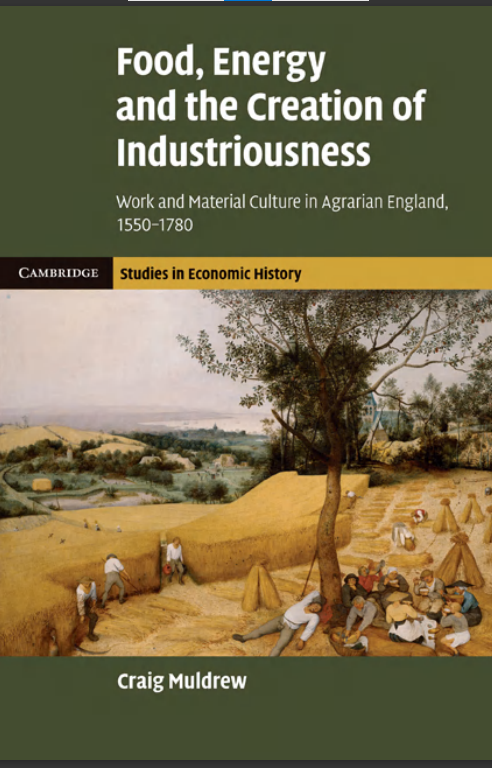
Food, Energy and the Creation of Industriousness
Author: CRAIG MULDREW Category: Bisnis Publisher: University of Cambridge ISBN: 978-0-521-88185-2 More DetailsThe subject of this book occurred almost accidentally. After finishing
my first book, The Economy of Obligation , I intended to take the themes
of that work forward into the eighteenth century, looking at the origin
of local banking and networks of trust. While that work has continued,
some years ago I became interested in the consumption of the labouring
poor through my work into wage payments and research done for the
chapter in The Economy of Obligation which examined household consumption
and market transactions. There I was very surprised at the
amount of meat consumed and the high numbers of butchers in early
modern towns such as King’s Lynn. I presented this information in a
quite rudimentary form at a conference in 2000, where the argument
for a relatively high level of meat consumption was met with scepticism,
if not downright incredulity. Some years later, this spurred me on to do
much more research into diets, which in turn led me to consider Robert
Fogel’s work on human energy. I then attempted to think of human
energy in the same way as Tony Wrigley has analysed the input of animal
energy into agricultural production.
The study of labourers’ inventories also stemmed from work done for
The Economy of Obligation using probate inventories. When researching
in the Hampshire Record Office I noticed that there were much larger
numbers of labourers’ inventories than I thought existed. Subsequently
I found out that Leigh Shaw-Taylor had discovered labourers’ inventories
in Northampton and Lincolnshire. We then worked together to
discover samples of labourers’ inventories in other counties and had
them made machine readable with two British Academy Small Grants.
Here I have analysed this sample and, in doing so, naturally attempted
to test aspects of Jan de Vries’s theory of what he has termed the ‘industrious
revolution’, which has been one of the most stimulating recent
macro-theories of early modern economic development. Doing this led
me back to early modern economic pamphlet literature, where, to my
surprise, I found that industriousness had already been conceived of
as a way to increase England’s national wealth. This discovery allowed
me to make sense of change over time in a new way. Thus, the whole
project grew organically out of what at first seemed to be a series of separate
problems which gradually came together. As a result the themes
and structure of the book have evolved, often slowly, over the last five or
six years, but I think I have learned much more by chance and accident
rather than relying on hypothesis.
I have also learned even more from continual interaction with colleagues
at Cambridge, the University of Exeter, the University of
Bologna and elsewhere. At the beginning of this project it is fair to say
my knowledge of agrarian history was limited, as I had previously worked
mostly on urban records, but I have learned a great deal from friends
and colleagues doing agricultural history. I have benefited most from
many conversations with Leigh Shaw-Taylor. I have also learned much
from Mark Overton, who kindly provided me with data he already had
of labourers’ inventories from Kent after 1600, and Bob Allen, who told
me how useful Thomas Batchelor was as a source. Naomi Tadmor kindly
lent me her photocopy of Turner’s original diary to investigate his dinners.
James Bates also shared his great knowledge of brewing as well as
his excellent beer. I would also like to thank Ian Archer, Matthew Clark,
John Chartres, Martin Daunton, Diccon Cooper, Mark Dawson, Amy
Erickson, Laurence Fontaine, Peter King, Peter Kitson, Alysa Levene,
John Money, Carlo Poni, Emma Rothschild, Thomas Sokoll, Richard
Smith, Sarah Pennell, Roberto Scazzieri, Alexandra Shepard, Helen
Speechley, John Styles, Phil Withington and John Walter. Joe Barker,
Sarah Brown, Alec Corio, Nicola Henshall, Ian Keefe, Matt Ward, Ali
Warren and Matthew Westlake all worked as researchers transcribing
probate inventories and account books for me, and the book would have
been impossible without their excellent work. I would also like to thank
Tony Wrigley, Keith Wrightson, Paul Warde and Ken Sneath for reading
parts of the book, and finally Janine Maegraith for not only reading
the entire manuscript and making many helpful comments but attempting
to correct my dyslexic word-processing in heroic fashion. Finally it
remains to thank the various funding bodies which have helped make
this research possible. Since, as I said, it is a work which evolved in
pieces, it required a number of small grants, which in this way are just
as useful and necessary to the research community as large grants. Over
the gestation of the book the Ellen Macarthur Fund, the Centre for
History and Economics and Queens’ College Fellows Research Fund
have all helped. The British Academy awarded Small Research Grant
no. SG-40825, ‘The Material Wealth and Work of the Labouring Poor
in England as Reflected in Probate Inventories, 1570–1790’, to transcribe
the labourers’ inventories. The Bologna Institute for Advanced
Studies provided me with a three-month fellowship from February to
April 2005 which allowed me to start writing and to present my findings
there. I would like especially to thank Carlo Poni and Roberto
Scazzieri for showing such hospitality during my visit. Finally I would
like to thank the Arts and Humanities Research Council, whose award
of a term of leave in 2008 under their Research Leave Scheme allowed
me to finish the first draft of the book.